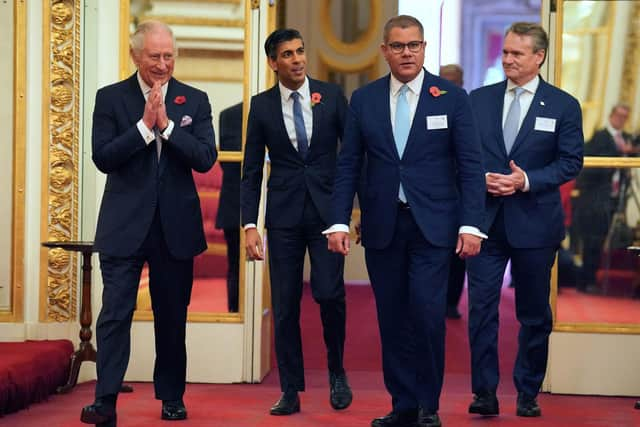The King's clear thinking on climate change will be missed at COP27 - Philip Lymbery
It seems a fitting descriptor for a period that has seen a global pandemic followed by a brutal new war in Europe, a cost-of-living crisis and political turmoil with three UK prime ministers in three months.
It is a word that also sums up the growing fear of where we could end up if world leaders fail to get on top of climate change.
Advertisement
Hide AdAdvertisement
Hide AdWith world governments gathering for COP27, the UN climate conference in Sharm el-Sheikh, Egypt this week, there are few people in my view with greater clarity over what needs to be done than King Charles III.
For more than five decades, the former Prince of Wales has been a champion for the fight against climate change and biodiversity loss.
With Westminster in turmoil, you would have thought that the UK Government would have leapt at the chance of having such a powerful, committed, and clear-thinking advocate representing the country on these issues.
Yet, while Liz Truss was still prime minister, Buckingham Palace announced that the King would not attend the conference. With days to go, the position had not been changed under new prime minister Rishi Sunak.
In Glasgow last year at the opening ceremony of the conference, the then HRH The Prince of Wales called for world leaders to go on a “war-like footing” to tackle climate change.


His vision was of a world where we overcome our differences to “to rescue this precious planet and save the threatened future of our young people.”
HRH went on to call for “a vast military-style campaign” to marshal the strength of the global private sector.
He could see that there is no point fooling ourselves that we can’t afford it right now. That the cost of doing nothing to address climate change will be far greater than digging deep to prevent runaway global warming.
Advertisement
Hide AdAdvertisement
Hide AdDespite previous pledges by world governments under the UN Paris Agreement, the world remains on course for a 2.5 degree Celsius of warming by the end of the century. This is well beyond the 1.5 degrees Celsius ‘safe’ level.
Underscoring how much world leaders still have to do, a new report from UN Climate Change finds that, compared to 2010 levels, we remain on course to increase emissions by a further 10 per cent by 2030.
This contrasts strongly with calculations by the Intergovernmental Panel on Climate Change (IPCC) that the world needs to cut emissions by nearly half by 2030 if we are to bend the curve away from catastrophe.
According to the UN, we are still nowhere near the scale and pace of emissions reductions required to put us on track toward a 1.5 degrees Celsius world.
To keep this goal alive, national governments need to take immediate action, strengthening their climate action plans for swift roll-out. Earlier this autumn, global experts meeting in Cairns, Australia highlighted the need
for more nature-based solutions in tackling climate change and called for much greater funding in this area.
Nature-based solutions are actions to protect natural ecosystems that benefit people whilst contributing to tackling climate change and protecting biodiversity. Examples here include protecting or planting mangroves in coastal areas to reduce the impact of storms on human lives, absorbing carbon and at the same time providing habitats for fish, birds and other plants.
Their call was reinforced recently by the shocking findings of the WWF Living Planet Report which found that in the span of 50
years, we’ve lost as much as 69% of our planet’s wildlife.
Advertisement
Hide AdAdvertisement
Hide AdReversing this trend means transformational change on many fronts, not least in agriculture where intensification has become the biggest driver of wildlife declines and integral to driving climate change.
Yet food and farming have remained conspicuously absent from previous climate discussions.
Enter King Charles III: Just days before COP27, a global ‘coalition of the willing’ brought together by the former Prince of Wales has launched a new report showing the major role agriculture needs to play if we are to be successful in addressing climate change and
the collapse of nature.
The report’s findings are that nature-friendly regenerative farming – whilst expanding its footprint over recent years – must triple its rate of growth to deliver against the world’s need to limit climate change. It needs to make up at least 40% of global cropland by 2030, up from around 15% today.
What I find encouraging is that behind the report are some of the world’s largest and most influential food and farming companies.
A diverse gathering of household names, including Mars, McCain Foods, McDonald’s, and Waitrose, are apparently united by a self-avowed common ambition to enable regenerative farming to become mainstream.
And mainstream it needs to be.
Regenerative farming involves working with nature, restoring animals to the land as rotational grazers or foragers where they can express their natural behaviours – running, flapping, grazing – making for happier animals with better health too.
Regenerative farming cuts reliance on chemical pesticides, fertilisers and antibiotics, reducing costs to farmers and creating a varied landscape bursting with wildflowers that lure back pollinating insects like bumblebees, as well as providing seeds and insects for birds and other wildlife.
Advertisement
Hide AdAdvertisement
Hide AdCrucially, it regenerates the soil, building back soil health which helps biodiversity underground, increases water conservation and captures carbon from the atmosphere.
You could see it as the King’s approach to farming, something much needed if we are to move beyond climate-induced permacrisis.
Philip Lymbery is Global CEO of Compassion in Farming International, a former United Nations Food Systems Champion.
His new book Sixty Harvests Left: How to Reach a Nature Friendly Future is out now and available from all leading bookstores